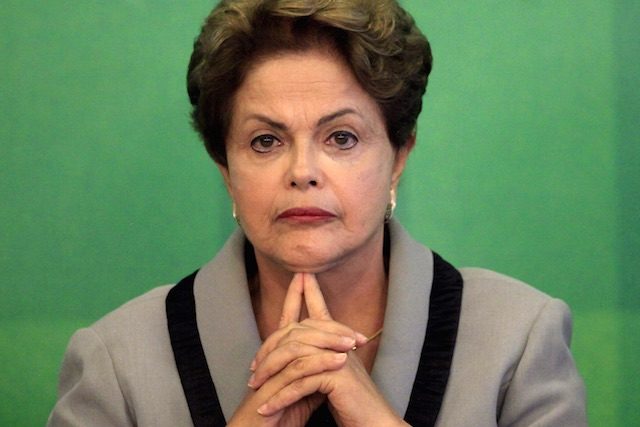SUMMARY
This is AI generated summarization, which may have errors. For context, always refer to the full article.

BRASILIA, Brazil – Brazil’s Dilma Rousseff tried to get ahead of the storm of scandal bearing down on her presidency Wednesday, March 18, unveiling a raft of anti-corruption measures she hopes will appease her critics.
Rousseff and her Workers Party have been tarnished by an investigation into a massive kickback scheme operated by the state oil giant Petrobras during a period when she chaired its board.
With street protests mounting and a series of arrests moving closer to her inner circle, she has prepared a package of legislation aimed at restoring her reputation.
“We are a government that does not tolerate corruption and we have the duty and obligation to fight impunity and corruption,” she said.
The package includes bills to criminalize under-the-table campaign contributions, seize property from government officials who cannot document its origin and bar anyone with a criminal record from public office.
Economic slowdown
Rousseff, who was re-elected only 5 months ago, is reeling from nationwide demonstrations against her that drew hundreds of thousands of Brazilians into the streets Sunday, March 15.
Her approval rating has plunged to a dismal 13%, according to a poll published Wednesday, and the left-wing leader has presided over a sharp economic slowdown.
But it is the scandal at Petrobras, whose board she chaired during much of the period under review, which has her administration under siege.
Prosecutors say the state-controlled oil giant awarded inflated contracts to some of the country’s biggest construction companies over a 10-year-period.
This generated a flood of dirty money estimated at some $3.8 billion and used to bribe Petrobras officials and pay off politicians.
Nearly 50 politicians, mainly Rousseff allies in Congress or leaders of her own party, are under investigation.
Among those charged is Workers’ Party treasurer Joao Vaccari, accused of receiving huge bribes that he insists were legal campaign donations.
Others being questioned include the head of the senate and the speaker of the chamber of deputies, both leading figures in the centrist Brazilian Democratic Movement Party, a key component of Rousseff’s coalition.
Taken a beating
The 67-year-old president has not been personally implicated, and the Supreme Court on Wednesday rejected an opposition call to investigate her after a judge ruled the petition contained “technical errors.”
But her popularity has taken a beating.
60% of those surveyed in Wednesday’s poll said they believed the country’s economic situation was worsening, against 15% who thought it would improve – the most negative result since polling firm Datafolha began asking the question in 1997.
The poll also showed fall-offs in Rousseff’s popularity across all socioeconomic groups, as well as in areas considered regional strongholds by her party.
Disapproval of her performance was the highest for any president since Fernando Collor de Mello in September 1992, on the eve of his impeachment.
At the time, Collor resigned after Brazil’s lower house voted to try him in a separate corruption scandal. He is now a senator implicated in the Petrobras case.
Rousseff, who became Brazil’s first woman president in 2011, narrowly won re-election to a new 4-year term in October.
A former leftist guerrilla known for her tough managerial style, she has struggled to tap the same popular support as her charismatic predecessor and mentor, Luiz Inacio Lula da Silva.
After unveiling the anti-corruption measures, Rousseff said she was on a personal mission to tackle corruption long endemic in Brazil.
“Corruption offends and humiliates workers and minimizes the importance of honest toil,” she said. “The time has come for Brazil to put an end to these crimes and practices.”
Political scientist Michael Mohallen, a professor at the Getulia Vargas Foundation in Rio, told Agence France-Presse there were 3 key elements to the crisis assailing Rousseff.
These are the Petrobras affair, a general feeling that government is isolated and the low-growth economy, inflation rising and the local currency plunging against the dollar. – Damian Wroclavsky, AFP / Rappler.com
Add a comment
How does this make you feel?
There are no comments yet. Add your comment to start the conversation.